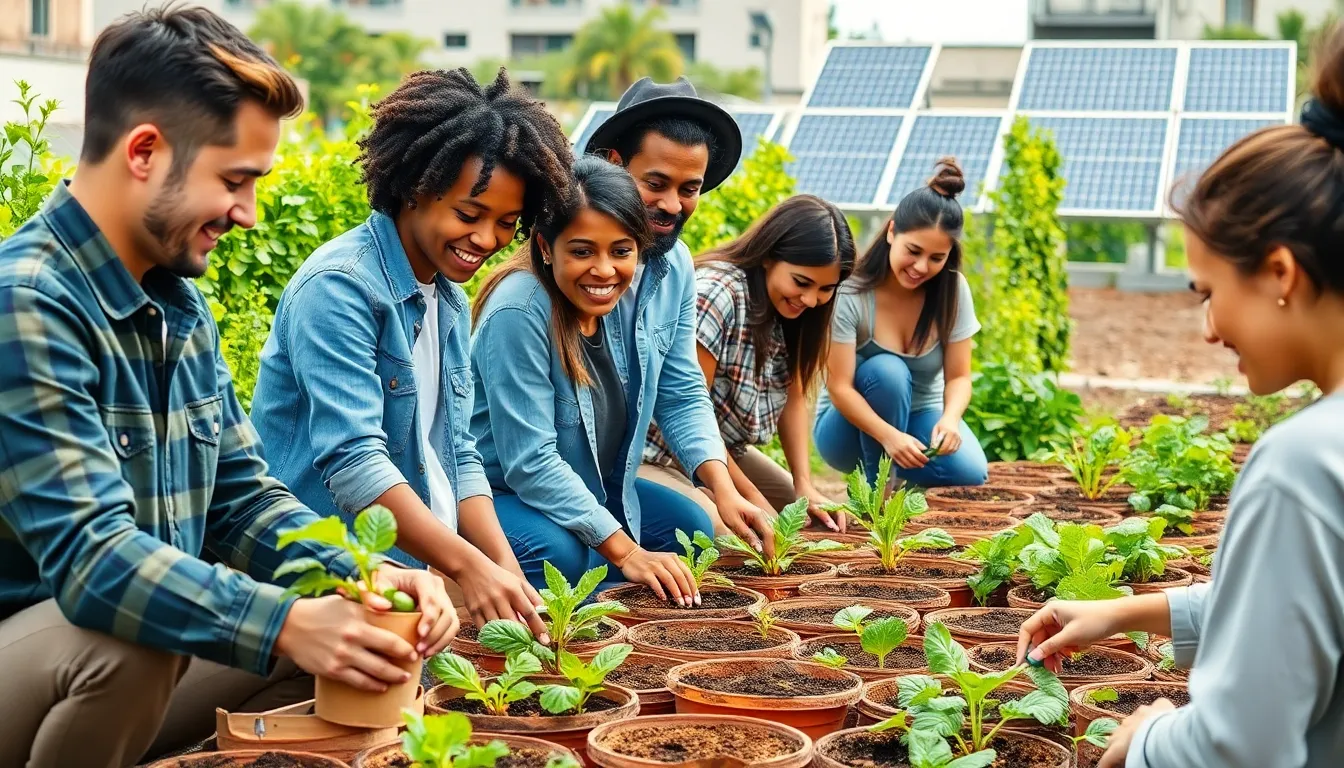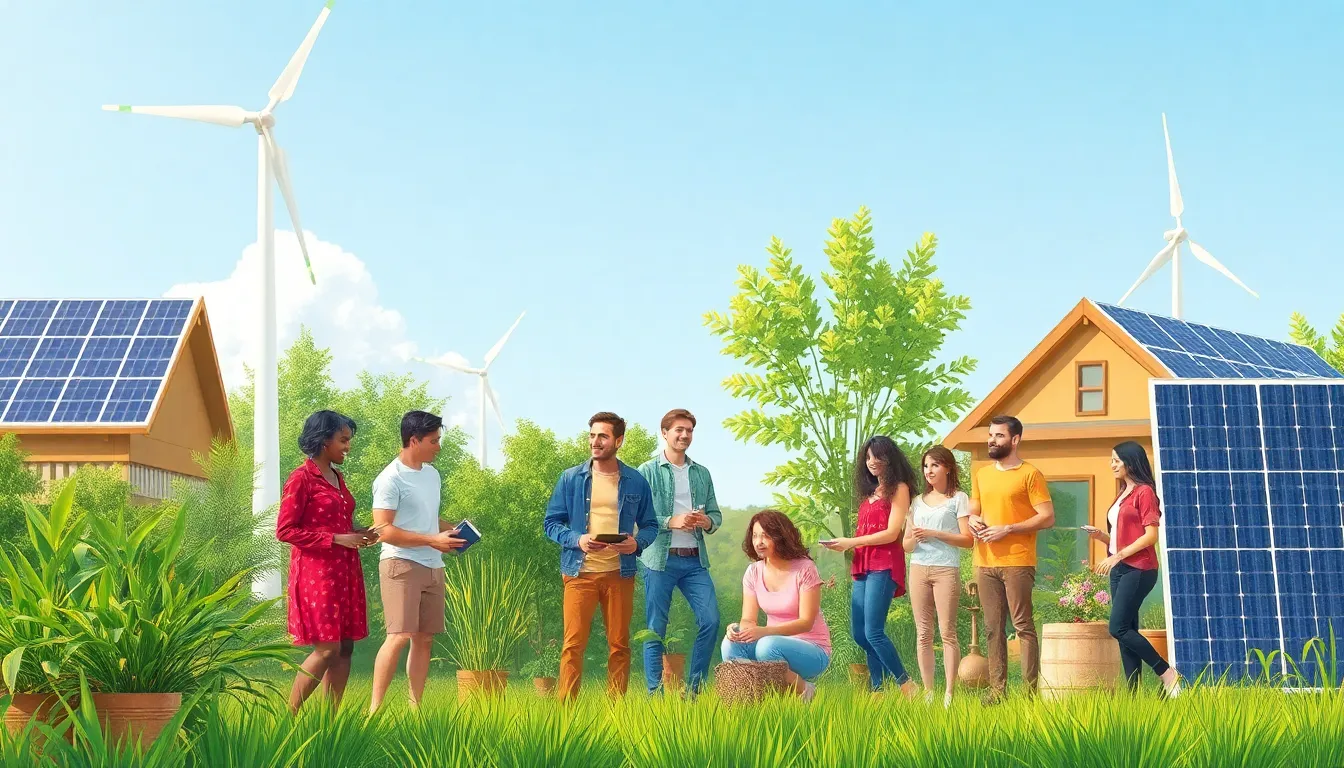Phone:
(701)814-6992
Physical address:
6296 Donnelly Plaza
Ratkeville, Bahamas.

In a world where the planet’s health often feels like a game of Jenga, sustainable living innovations are the eco-friendly moves that keep it from toppling over. Imagine a future where your morning coffee powers your home or where your garden compost is the secret ingredient to a thriving urban jungle. Sounds like a dream? It’s not—it’s happening right now, and it’s about time we all hopped on this green train before it leaves the station.
From solar-powered gadgets that make your neighbors jealous to biodegradable packaging that won’t haunt future generations, these innovations are changing the way we live. Embracing sustainability isn’t just a trend; it’s a lifestyle that promises a healthier planet and a happier you. So buckle up and get ready to explore the clever, quirky, and downright brilliant ways people are making sustainable living not just possible, but downright exciting.
Sustainable living innovations focus on reducing environmental impacts while improving quality of life. Various advancements have emerged in renewable energy technology, which includes solar panels and wind turbines. Smart home systems enhance energy efficiency by optimizing consumption patterns.
Water conservation technologies, such as rainwater harvesting and low-flow fixtures, help households minimize usage and reliance on municipal water sources. Green building practices prioritize sustainable materials and energy-efficient designs in new constructions and renovations.
Innovations in transportation include electric vehicles and bike-sharing programs that reduce carbon emissions. Urban farming initiatives promote local food production, making fresh produce accessible while decreasing transportation footprints.
Composting systems aid in organic waste management, turning food scraps into nutrient-rich soil. Biodegradable packaging options replace traditional plastics, lessening pollution and enhancing waste management solutions.
Community initiatives and educational programs encourage sustainable practices, fostering awareness and engagement in eco-friendly living. These various innovations demonstrate a commitment to nurturing the planet while enhancing lifestyles.

Sustainable living innovations encompass a variety of creative solutions aimed at reducing ecological footprints while enhancing life quality.
Innovations in renewable energy significantly contribute to sustainable living. Solar panels capture sunlight and convert it into electricity, providing a clean power source. Wind turbines harness wind energy, offering a sustainable alternative to fossil fuels. Geothermal systems utilize heat from the earth for efficient heating and cooling. Biomass energy, derived from organic materials, plays a role in reducing waste. Together, these technologies lower greenhouse gas emissions, promote energy independence, and lower utility costs.
Construction practices are evolving with the incorporation of eco-friendly building materials. Bamboo serves as a renewable resource due to its rapid growth, making it an excellent substitute for traditional lumber. Recycled steel reduces the demand for new materials, minimizing environmental impact. Additionally, reclaimed wood used in new buildings adds charm while decreasing landfill waste. Insulation made from recycled materials offers both energy efficiency and sustainability. These materials enhance the durability of structures while promoting greener construction methods.
Waste reduction technologies address the escalating issue of landfill waste. Composting systems transform organic waste into valuable fertilizer, supporting healthy soil and plant growth. Advanced recycling facilities sort and process waste more effectively, maximizing resource recovery. Zero-waste initiatives encourage individuals and businesses to minimize waste generation actively. Innovations like smart bins, which track waste levels, improve waste management practices. These technologies collectively contribute to a circular economy, fostering sustainability and reducing pollution.
Sustainable living innovations deliver multiple advantages that extend beyond personal lifestyle choices. These benefits significantly impact the environment and the economy.
Innovations in sustainable living lead to substantial reductions in greenhouse gas emissions. Increased use of renewable energy sources, such as solar panels and wind turbines, plays a critical role in combating climate change. Implementing eco-friendly materials, like bamboo and recycled steel, decreases resource extraction and waste production. Community initiatives, coupled with urban farming techniques, promote biodiversity and reduce the carbon footprint associated with food transportation. Engaging in waste reduction practices, such as composting and recycling, fosters a circular economy that limits landfill usage. Ultimately, these innovations contribute to preserving natural ecosystems, enhancing planet health for future generations.
Sustainable living innovations result in significant economic benefits for individuals and communities. Lower energy consumption leads to reduced utility bills, directly affecting household budgets. As the demand for green technologies grows, job creation in renewable energy sectors rises, boosting local economies. Investing in sustainable building materials can increase property values through improved energy efficiency and lower maintenance costs. Furthermore, local food production initiatives often lead to decreased reliance on imported goods, fostering economic resilience. Overall, these advancements drive innovation, create opportunities, and enhance economic stability, promoting long-term financial well-being.
Technological advancements in sustainable living face various challenges. High initial costs often deter individuals and businesses from adopting new solutions. Innovations like solar panels and energy-efficient appliances can require significant upfront investment, leading to hesitation for many.
Regulatory barriers also impede progress. Local, state, and federal policies may not always support sustainable initiatives, creating a complex regulatory landscape that discourages innovation.
Awareness and education play critical roles in the adoption of sustainable living innovations. Many potential users lack knowledge regarding available technologies and their benefits. Increased outreach is essential for fostering understanding and encouraging widespread acceptance.
Economic factors significantly influence implementation. Fluctuating prices for renewable energy resources and sustainable materials can create uncertainty in market stability. Consequently, businesses may hesitate to invest in innovative solutions that could lead to long-term benefits.
Cultural perceptions can hinder advancements as well. Some communities resist changes due to traditions or skepticism about new technologies. Efforts aimed at improving cultural acceptance are necessary for promoting sustainable practices.
Lastly, technical challenges also emerge with new innovations. Integration of advanced technologies into existing infrastructures can pose compatibility issues. Ensuring seamless adaptation requires ongoing research and development focused on enhancing efficacy.
These challenges highlight the complexities surrounding the implementation of sustainable living innovations. Addressing these barriers effectively fosters a more sustainable future for both individuals and communities.
Innovative technologies shape the future of sustainable living in various impactful ways. Smart homes equipped with energy management systems optimize electricity consumption, significantly reducing utility bills. Urban areas can benefit from vertical gardens, enabling food production in metropolitan spaces while improving air quality.
Renewable energy storage systems are gaining traction, allowing excess solar and wind energy to be stored and used during peak demand times. Electric vehicles continue to advance, with more manufacturers committed to producing affordable models, leading to increased adoption.
Waste-to-energy technologies transform organic waste into usable power, addressing waste management challenges while contributing to energy solutions. Furthermore, sustainable fashion initiatives are on the rise, encouraging consumers to choose eco-friendly materials and ethical manufacturing practices.
Water conservation systems, such as rainwater harvesting and greywater recycling, are becoming standard in new constructions, enhancing resource efficiency. Biodegradable alternatives to single-use plastics are being developed, with many companies committed to eliminating traditional plastic products in their supply chains.
Community-driven projects are also on the rise, fostering local engagement in sustainability efforts and enhancing resilience. Innovations in green transportation, such as improved cycling infrastructure and electric public transit options, promote eco-friendly commuting while reducing urban congestion.
Research indicates that emerging trends emphasize a shift toward decentralized energy systems, allowing communities to generate and manage their energy. With consumer demand for sustainable products growing, companies are prioritizing transparency and eco-friendliness in their operations.
Sustainable living innovations are reshaping how individuals and communities interact with the environment. By embracing these advancements, people can significantly reduce their ecological footprints while enhancing their quality of life. The ongoing development of technologies and practices not only addresses current environmental challenges but also paves the way for a more resilient future.
As awareness grows and barriers are addressed, the potential for widespread adoption of sustainable solutions increases. This shift is crucial for fostering a collective commitment to preserving the planet. Ultimately, sustainable living is more than a choice; it’s a necessary evolution toward a healthier and more sustainable world for generations to come.